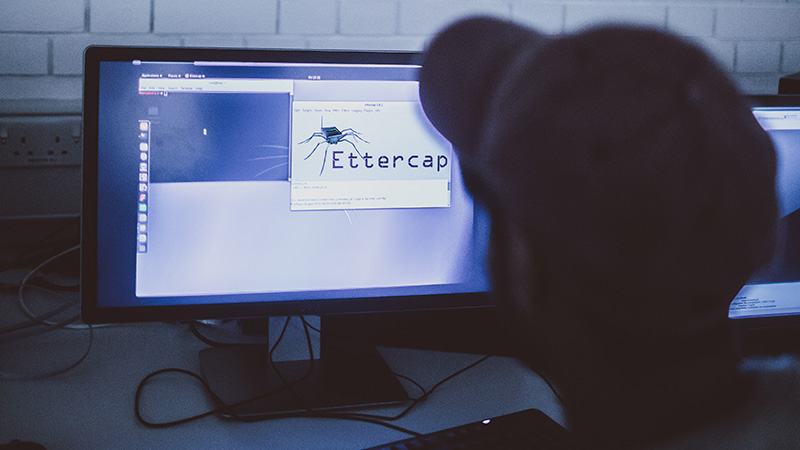Computer Science for Cyber Security
MSc or PGDip or PGCert
Start dates: September 2026
Full time: MSc - 1 year (12 months); PG Dip - 6 months; PG Cert - 3 months
Part time: MSc - 2 years (24 months); PG Dip - 18 months (12 months study time); PG Cert - 6 months
Location: Headington
Overview
Cyber-attacks are some of the biggest threats to national security today. With everything from health records to financial data stored online, people and businesses face constant risk from malicious attacks. Could you protect them?
If you have a computing degree (or lots of experience in the industry), you’ll have the technical skills to join this gold-standard course fully certified by the NCSC (National Cyber Security Centre) a part of GCHQ. Our expert teaching staff will help you hone those skills until you’re ready to take up the challenge yourself.
Unlike some courses which deal with regulations and legislation for cyber security, we focus on developing secure networks and software. That means you’ll be working in our labs, practising offensive and defensive techniques. You’ll be working on live projects and alongside others as you would in the industry. You’ll build your knowledge until you’re an expert in everything from reverse engineering to OS development.

Why Oxford Brookes University?
-
A gold-standard qualification
With a NCSC-certified degree, our cyber security graduates are in high demand in all sorts of organisations.
-
Original and inspiring research
We’re home to top researchers in areas ranging from digital forensics to computer vision. You can get involved in some of our work, including the Cloud Computing and Cybersecurity Group.
-
New State-of-the-art facilities
All Computing courses are based in new, custom designed buildings at our main Headington site. You'll benefit from state-of-the-art facilities and equipment including a VR cave, digital, computing and robotics labs, as well as social learning spaces, teaching rooms and cafe space.
-
Technically challenging
There’s a strong focus on secure networking and software development – you’ll develop more advanced programming skills than you would on many comparable courses.
Course details
Start this course in January or September
You can start this course in January if a September start doesn't suit you or is not currently offered for this course.
If you start in January you will study a range of modules between January and May. During the summer months of June, July and August you will study further modules and begin work on your dissertation. Between September and December you will complete your final modules and focus on your dissertation.
Study modules
The modules listed below are for the master's award. For the PGDip and PGCert awards your module choices may be different. Please contact us for more details.
Please note: As our courses are reviewed regularly as part of our quality assurance framework, the modules you can choose from may vary from those shown here. The structure of the course may also mean some modules are not available to you.
Research
The School of Engineering, Computing and Mathematics is home to world-leading and award-winning research. Our focus is on user-inspired original research with real-world applications. A wide range of activities from model-driven system design and empirical software engineering through to web technologies, cloud computing and big data, digital forensics and computer vision.
Staff and students collaborate on projects supported by the EPSRC, the EU, the DTI, and several major UK companies.
Computing achieved an excellent assessment of its UoA (Unit of Assessment) 11 return for REF 2014 (Research Excellence Framework).
Students on this course can be involved with research in the following research groups:
Careers
Cyber security is important in a huge range of organisations, so your skills will be in high demand. Past graduates are working everywhere from small startup businesses to the NHS. Relevant roles you could look for include:
- IT security professional
- penetration tester
- digital forensic investigator
- software developer
- systems engineer
- technical analyst
- IT manager
- consultant.
You may also consider carrying on your research – either with a private company or by applying for a PhD.
Entry requirements
Specific entry requirements
To join this course you'll need a 2:2 UK bachelor's degree in a computer-related subject. If you're without a degree in computing, but you have worked in the computing industry you can also be considered. If you have no experience or degree in a computing related discipline then you should consider our MSc in Computing Science. You would normally be proficient at programming in C++/Java or similar.
Please also see the University's general entry requirements.
English language requirements
If your first language is not English you will require a minimum IELTS score of 6.0 with 6.0 in all components.
OR
An equivalent English language qualification acceptable to the University.
Please also see the University's standard English language requirements.
English requirements for visas
If you need a student visa to enter the UK you will need to meet the UK Visas and Immigration minimum language requirements as well as the University's requirements. Find out more about English language requirements.
Terms and conditions of enrolment
When you accept our offer, you agree to the Terms and Conditions of Enrolment. You should therefore read those conditions before accepting the offer.
International qualifications and equivalences
How to apply
Application process
Tuition fees
Questions about fees?
Contact Student Finance on:
Tuition fees
The following factors will be taken into account by the University when it is setting the annual fees: inflationary measures such as the retail price indices, projected increases in University costs, changes in the level of funding received from Government sources, admissions statistics and access considerations including the availability of student support.
How and when to pay
Tuition fee instalments for the semester are due by the Monday of week 1 of each semester. Students are not liable for full fees for that semester if they leave before week 4. If the leaving date is after week 4, full fees for the semester are payable.
- For information on payment methods please see our Make a Payment page.
- For information about refunds please visit our Refund policy page
Additional costs
Please be aware that some courses will involve some additional costs that are not covered by your fees. Specific additional costs for this course are detailed below.
Optional costs
| Additional costs | Amount (£) |
|---|---|
| Travel and associated costs if relevant when undertaking work placements. | £30-700 per year |
If you are considering bringing your own computer, most of the software we use is on Windows machines though there is some use of Linux. We do not use Apple MacOS and their use is not required but some students do choose to bring MacOS machines so a Mac can be a viable choice if you so wish.
|
£500-1200 |
It’s your responsibility to cover print / binding costs where coursework submission is required. Please note that a lot of the coursework is now submitted online. |
From £30 |
| You may choose to purchase books to support your studies. Many books on our reading lists are available via the Library, or can be purchased secondhand. | £20-60 per book |
Accommodation fees in Brookes Letting (most do not include bills) |
£107-301 per week |
Accommodation fees in university halls (bills included, excluding laundry costs) |
£139-248 per week |
Graduation costs include tickets, gowning and photography. Gowns are not compulsory but typically students do hire robes, starting at £41. |
Typically £0-200 |
Students are responsible for their own travel to and from university for classes. For the 2025/26 academic year, the University is introducing an alternative subsidised travel offer for all students with further information on our Travel webpages. |
From £10 |
Funding your studies
Financial support and scholarships
Featured funding opportunities available for this course.
All financial support and scholarships
Programme changes:
On rare occasions we may need to make changes to our course programmes after they have been
published on the website. For more information, please visit our
changes to programmes page.


